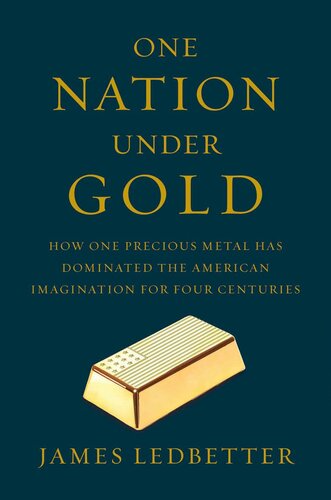
One Nation Under Gold
How One Precious Metal Has Dominated the American Imagination for Four Centuries
کتاب های مرتبط
- اطلاعات
- نقد و بررسی
- دیدگاه کاربران
نقد و بررسی

March 13, 2017
In this economic history, Ledbetter (Unwarranted Influence), editor at Inc. magazine, traces the complicated relationship between gold and American monetary policy, examining our reliance on the metal alongside our frequent attempts to sever that dependence. As Ledbetter explores and explains the waxing and waning of the gold standard, he shows how it affects America’s ties to the world economy, how it has influenced events in war and peacetime, and how private ownership of gold has been a quagmire of controversy and opportunism. Ledbetter notes that “for much of America’s history, gold literally was money—and therefore ignited some of the most contentious political battles the nation has ever seen.” However, his own expertise in the material doesn’t necessarily translate to accessibility; this is an excellent book for those well-versed in economic topics, but less useful for the casual reader. Ledbetter hews closely to the financial aspects of gold as an influence on the country’s progress, though he does touch upon some of the cultural, technological, and artistic roles it has played—such as the fate of the Golden Rooster of Las Vegas—which makes for some entertaining diversions. Ledbetter’s style is a little dry, but this is a solid look at America’s golden history.

April 15, 2017
Is the dollar as good as gold? Not for a long time, writes Inc. editor Ledbetter (Unwarranted Influence: Dwight D. Eisenhower and the Military-Industrial Complex, 2011, etc.), and therein hangs a tale.As the author notes, gold finds in Americans "a psychological wellspring that reaches beyond any purely physical qualities." Monetary gold, however, is more complicated: gold mania may be one thing, but a modern economy is better based on more abundant materials. Still, arguments for the gold standard, which was finally abandoned during Richard Nixon's second term, have been constant throughout American history. Ledbetter has a knack for finding the most interesting, if sometimes-obscure, pleas for gold, many offered by government officials. In the early Republic, one argued strenuously against paper currency, saying "there would be no end to the legion of paper devils which shall pour forth from the loins of the Secretary." In later times, the father of the multibillionaire Warren Buffett, a Nebraska congressman, urged that the Bretton Woods monetary agreements would weaken American sovereignty--which was being betrayed, he added, by Dwight Eisenhower, earning Buffett a reputation as "a bedrock reactionary who shot off his mouth once too often," as columnist Drew Pearson said. Arguments for and against the gold standard have as often been politically as economically grounded, and Ledbetter's book is a touch short on the actual mechanics of gold and its convertibility while satisfyingly long on the sharp political divisions that have formed around it. Now that individual Americans are allowed to own gold--a right, one Swiss-born commentator gloomily warns, that can be taken away at any time--it has returned to popularity. Meanwhile, politicians on the right, including Ted Cruz and Donald Trump, have either outright endorsed a return to the gold standard or confessed to a liking for the sound of it. An absorbing and often entertaining look at precious metal and its place--or lack thereof--in our wallets.
COPYRIGHT(2017) Kirkus Reviews, ALL RIGHTS RESERVED.

April 15, 2017
Stipulated as legal tender in the Constitution, gold has been a political force ever since. Perhaps because minted or printed money touches citizens like nothing else the federal government does, many an electoral and legislative controversy has been animated by the question of whether the dollar should be backed by gold or be gold. Ledbetter, editor of Inc. and well-versed in business history, starts with the Founders, who put the economy on a gold standard. In the first decades of the 1800s, gold coinage represented dependability. If the introduction of paper currency during the Civil War called into doubt the rationale of a gold-backed dollar, the 1896 election dispelled it. Silver champion William Jennings Bryan lost to William McKinley, who nailed the dollar solidly to gold. Recounting gold's fall under Franklin Rooseveltit was decoupled from the dollar and banned from private ownershipLedbetter explains the repercussions of the revival of a gold standard in 1944, Nixon's 1971 abandonment of it, and the relegalization of gold-ownership in 1974. A vibrant and fascinating account of monetary gold's volatile fortunes in the U.S.(Reprinted with permission of Booklist, copyright 2017, American Library Association.)

























دیدگاه کاربران